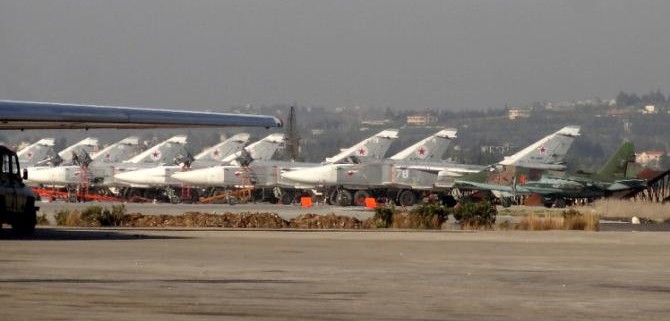PHOTO: Russian jet fighters on the runway at Hmeimim airbase in western Syria
President Assad has told Russian news outlets that Moscow can have a permanent airbase in Syria.
In the second part of an interview, published on Thursday, Assad was asked, “Do you believe, for instance, that Syria will need the Hmeimim base permanently?” He replied:
Inviting foreign forces to a certain state is the right of that state….I don’t believe there is a public opinion in Syria that wants this Russian support to stop, whether now or in the future, and consequently [it does not want] the departure of Russian forces….
The size of the forces in [the base[ should be proportionate to the size of the tasks these forces carry out and the size of terrorism in Syria. Terrorism is still strong. It is true that we succeeded, with the Russian forces, to reduce the size of the areas in which it exists, but it is still strong and volunteers are still coming from outside Syria.
Russia has had a naval base in Tartous since the 1970s. However, it only established a presence at the Hmeimim airbase, near Basel Assad airport in Latakia in western Syria, in summer 2015. Weeks later, Russian warplanes began thousands of airstrikes, more than 80% of them against opposition-held territory.
The base also supports thousands of Russian personnel who have carried out tasks on the ground, including offensives by the Syrian military, Hezbollah, Iran’s Revolutionary Guards, and foreign militia.
The President indicated that Russia would “reduce the size of the forces which have no tasks to carry out…after we defeat terrorism completely”, but did not give any signal for a full withdrawal.
Assad also said that Russia’s advanced S-400 anti-aircraft missiles would remain at the Hmeimim airbase. The systems were introduced in December, weeks after Turkey downed a Russian MiG-24 warplane that crossed the Turkish-Syrian border.
The statement was a further sign of the President’s desire to remain in power for the long-term, backed by Russia. In the first part of the interview, he rejected the international proposal — first tabled in 2012 and still being discussed in talks in Geneva — for a “transitional governing authority”.
See Syria Daily, March 31: Assad Rejects Transitional Government

